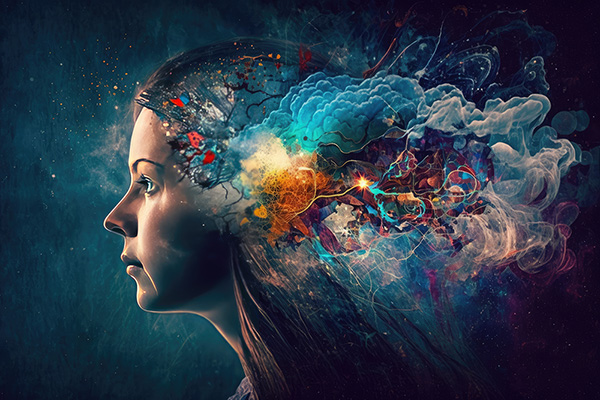Welcome to the Subconscious Mind
The subconscious brain is interesting because it is responsible for many of our thoughts, emotions, and behaviors, yet we often have little awareness of its workings. It is a powerful and complex part of our brain that is constantly processing vast amounts of information and shaping our beliefs and attitudes.
The subconscious mind (sometimes referred to as the unconscious mind) is still not fully understood or acknowledged. It is a vast and powerful part of our mind that operates largely beneath our conscious awareness, and by learning about how it works, we can gain valuable insights into our own thought processes and behaviors.
15 Interesting Facts About the Subconscious Mind You May Not Know
- The subconscious mind is much larger than the conscious mind. While the conscious mind is responsible for our immediate awareness and decision-making, the subconscious mind is responsible for processing and storing vast amounts of information, including memories, beliefs, and emotions. Modern science estimates that the subconscious mind uses 95-99% of our brain.
- The subconscious mind is active even when we sleep. During sleep, the subconscious mind continues to process information and make connections, which is why we often have vivid dreams that can reveal deeper thoughts and emotions.
- The subconscious mind can influence our behavior without us even realizing it. Our beliefs and attitudes, which are largely shaped by the subconscious mind, can influence our thoughts and actions in powerful ways, even if we’re not consciously aware of it.
- The subconscious mind is highly suggestible. This is why hypnosis and other forms of suggestion can be effective in changing behavior and beliefs. By accessing the subconscious mind, we can tap into its power to make positive changes in our lives.
- The subconscious mind can communicate through symbols and metaphors. This is why dreams, which are often filled with symbolic imagery, can provide insight into our deeper thoughts and emotions. By learning to interpret these symbols and metaphors, we can gain a deeper understanding of ourselves and our subconscious mind.
- The subconscious brain has a strong influence on our intuition. Intuition is the ability to understand something instinctively, without the need for conscious reasoning. It often involves a deep, subconscious understanding of a situation or problem.
- The subconscious brain can process information much faster than the conscious brain. While the conscious brain can only process a limited amount of information at once, the subconscious brain can process vast amounts of information simultaneously, allowing us to make split-second decisions without even realizing it.
- The subconscious brain can influence our physical health. Research has shown that the subconscious mind can help to regulate bodily functions such as blood pressure, heart rate, and immune system function. By tapping into the power of the subconscious mind, we can improve our physical health and well-being.
- The subconscious brain is heavily influenced by our environment. Our surroundings, including the people we interact with and the media we consume, can have a powerful impact on our beliefs, attitudes, and emotions, which are all shaped by the subconscious mind.
- The subconscious brain can be reprogrammed through positive affirmations and visualization. By repeating positive affirmations and visualizing desired outcomes, we can change the beliefs and attitudes stored in our subconscious mind, which can lead to positive changes in our thoughts, emotions, and behavior.
- The subconscious brain is responsible for our habits. Habits are behaviors that have become automatic, and they are largely shaped by the subconscious mind. By understanding how the subconscious mind influences our habits, we can learn to change them and develop healthier behaviors.
- The subconscious brain is strongly connected to our emotions. Emotions are processed in the limbic system of the brain, which is closely linked to the subconscious mind. This is why emotions can often feel overwhelming and difficult to control.
- The subconscious brain is influenced by our past experiences. Our memories, both positive and negative, are stored in the subconscious mind and can shape our beliefs and behaviors in the present.
- The subconscious brain is closely connected to our creativity. The subconscious mind is responsible for processing and making connections between different ideas and concepts, which can lead to creative insights and breakthroughs.
- The subconscious brain can be accessed through meditation and hypnosis. These practices allow us to enter a relaxed and focused state of mind, which can help us access the deeper layers of our subconscious mind and make positive changes to our thoughts, emotions, and behavior.
The subconscious mind is a fascinating and valuable aspect of our mental life that deserves our attention and understanding. It plays a crucial role in shaping our thoughts, emotions, and behaviors, often beneath our conscious awareness.
The Power of the Subconscious Mind
One powerful tool for accessing the subconscious mind is positive affirmations, which involve repeating positive statements to ourselves in order to reprogram our beliefs and attitudes. By doing so, we can change our mindset and achieve a more positive outlook on life.
Another way to tap into the power of the subconscious mind is through the law of attraction, which involves manifesting our desires by focusing our thoughts and intentions on what we want. This can be done through visualization and other techniques that help us align our thoughts and emotions with our goals.
Dream interpretation is another way to gain insight into our subconscious mind. Dreams often contain symbolic imagery that can reveal deeper thoughts and emotions, and by learning to interpret these symbols, we can gain a greater understanding of ourselves and our inner selves.
Hypnotherapy and psychotherapy are powerful tools for accessing the subconscious mind and promoting self-awareness and self-discovery. Through these techniques, we can gain insight into our beliefs and behaviors and make positive changes in our lives.
The subconscious mind is also a powerful tool for personal growth and self-improvement. By learning to access and reprogram our subconscious mind through techniques such as hypnosis, visualization, and positive affirmations, we can break free from negative patterns and beliefs and cultivate a more positive and fulfilling mindset.
Negative Thoughts and the Subconscious Mind
Negative thoughts can have a powerful impact on our mental and emotional well-being, and they often originate in the subconscious mind. Our past experiences, beliefs, and attitudes are all stored in the subconscious, and they can influence our thoughts, emotions, and behaviors in subtle ways.
When negative events occur, they can leave a lasting impression on our subconscious mind, and this can lead to negative thoughts and emotions that can persist long after the event has passed. These subconscious thoughts can become ingrained in our mental processes and influence our brain activity, leading to a cycle of negative thinking and behavior.
This can have a significant impact on our human behavior and decision-making, as negative emotions and thoughts can cloud our judgment and make it more difficult to make conscious choices that align with our values and good intentions.
However, it is important to note that we do have the power to make positive changes in our subconscious mind and shift our mindset towards a more positive and self-aware state. By practicing self-improvement techniques such as positive affirmations, visualization, and meditation, we can reprogram our subconscious thoughts and beliefs, leading to a more positive outlook on life.
Through psychotherapy, hypnotherapy, and dream interpretation, we can also gain a deeper understanding of our inner self and the root causes of our negative thoughts and emotions. This self-discovery can lead to a greater sense of self-awareness and enable us to make conscious choices that are aligned with our goals and values.
Ultimately, by understanding how negative thoughts work in the subconscious and taking intentional steps towards positive change, we can cultivate a more positive and fulfilling life. It is a journey that requires effort and patience, but with dedication and good intention, we can overcome negative thought patterns and live a more joyful and fulfilling life.
The Mind-Body Connection
The mind-body connection refers to the relationship between our mental processes and physical health. This connection is deeply intertwined with the subconscious mind, which is responsible for regulating many of our bodily functions without conscious recall.
Our life events and experiences can have a profound impact on the different levels of the mind, including the conscious and subconscious. For example, trauma or negative experiences can create patterns in the subconscious mind that affect our daily life and behavior. On the other hand, positive life events and experiences can help us develop new habits that promote a happy life.
Part of the mind responsible for subconscious processes is different from conscious thinking. Conscious thinking is associated with neural circuits that operate in our prefrontal cortex, while subconscious processes occur in various parts of the brain.
When we develop new habits or behaviors, we are actually rewiring the neural circuits in our brain. By consciously practicing positive thinking and focusing on the good intentions behind our actions, we can help reinforce positive neural pathways in the brain. Over time, this can lead to positive changes in behavior and a happier life.
In order to tap into the power of the subconscious mind, it is important to understand the different levels of the mind and how they interact with each other. By cultivating awareness and practicing mindfulness, we can better connect with the subconscious and develop a deeper understanding of our mental processes. With this knowledge, we can consciously make choices that support positive change and a happy, fulfilling life.
The mind-body connection is a powerful one, and by tapping into the power of your subconscious mind, we can promote healing and achieve greater levels of wellness.
The subconscious mind is a vast and complex part of our mental life that offers a wealth of knowledge and insight. By exploring and understanding the workings of our subconscious mind, we can unlock our full potential, live more fulfilling lives, and achieve greater levels of happiness and well-being.

